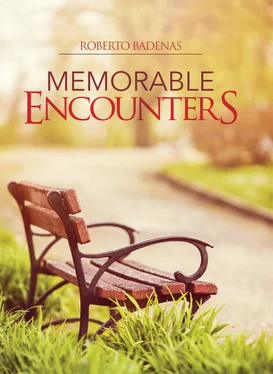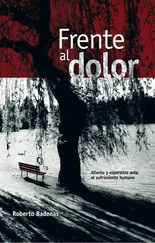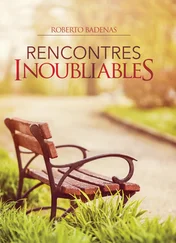Roberto Badenas - Memorable Encounters
Здесь есть возможность читать онлайн «Roberto Badenas - Memorable Encounters» — ознакомительный отрывок электронной книги совершенно бесплатно, а после прочтения отрывка купить полную версию. В некоторых случаях можно слушать аудио, скачать через торрент в формате fb2 и присутствует краткое содержание. Жанр: unrecognised, на английском языке. Описание произведения, (предисловие) а так же отзывы посетителей доступны на портале библиотеки ЛибКат.
- Название:Memorable Encounters
- Автор:
- Жанр:
- Год:неизвестен
- ISBN:нет данных
- Рейтинг книги:4 / 5. Голосов: 1
-
Избранное:Добавить в избранное
- Отзывы:
-
Ваша оценка:
- 80
- 1
- 2
- 3
- 4
- 5
Memorable Encounters: краткое содержание, описание и аннотация
Предлагаем к чтению аннотацию, описание, краткое содержание или предисловие (зависит от того, что написал сам автор книги «Memorable Encounters»). Если вы не нашли необходимую информацию о книге — напишите в комментариях, мы постараемся отыскать её.
Memorable Encounters — читать онлайн ознакомительный отрывок
Ниже представлен текст книги, разбитый по страницам. Система сохранения места последней прочитанной страницы, позволяет с удобством читать онлайн бесплатно книгу «Memorable Encounters», без необходимости каждый раз заново искать на чём Вы остановились. Поставьте закладку, и сможете в любой момент перейти на страницу, на которой закончили чтение.
Интервал:
Закладка:
Memorable Encounters
Reduced version of Encounters
Author: Roberto Badenas
Project development: Editorial Safeliz, S. L.
Design and layout: Avatar Estudio
Cover design: Bezalel&Aoliabe design
Translation: Annette D. Melgosa
Edited by Penny Wheeler and copyedited by James Cavil
Copyright © Editorial Safeliz, S. L.
Pradillo, 6 · Pol. Ind. La Mina
E-28770 · Colmenar Viejo, Madrid, Spain
Tel.: [+34] 91 845 98 77 · Fax: [+34] 91 845 98 65
admin@safeliz.com · www.safeliz.com
All rights reserved. No part of this book may be transmitted
or reproduced in any form or by any means,
electronic or mechanical, including photocopying and recording,
or by any information storage and retrieval system,
without permission in writing from the publisher.
Scripture quotations marked (NIV) are taken from the Holy Bible, New International Version®, NIV®. Copyright © 1973, 1978, 1984, 2011 by Biblica, Inc.™ Used by permission of Zondervan. All rights reserved worldwide. www.zondervan.com. The “NIV” and “New International Version” are trademarks registered in the United States Patent and Trademark Office by Biblica, Inc.™
Scripture quotations marked (NKJV) are taken from the New King James Version®. Copyright © 1982 by Thomas Nelson. Used by permission. All rights reserved.
Scripture quotations marked (NEB) are taken from the New English Bible, copyright © Cambridge University Press and Oxford University Press 1961, 1970. All rights reserved.
September 2016: 1st edition in English language
ISBN: 978-84-7208-245-8
Printed in THAILAND
IMP01
Index
1 - In the Desert 7
2 - In the Night 19
3 - By the Well 33
4 - At the Beach 43
5 - In the Courtyard 55
6 - At the Foot of the Mountain 65
7 - At Dawn 79
8 - On a Trip 93
9 - Alone with the Master 105
10 - On Their Way 115
11 - Under a Tree 127
12 - At the Feast 139
13 - At a Supper 149
14 - Among the Columns 157
15 - In the Evening 177
16 - Farewell with Friends 189
In the Desert
Looking for the other One
The Jordan River snakes its way down through the Judean desert, dropping nearly 1,300 feet below sea level before finally entering the stagnant waters of the Dead Sea. The lowest area on earth, this is a place steeped in history.
It seems hard to believe that this bleak land, so tortured by erosion and scorched by the fire of heaven, once embraced the modern, vibrant city of Sodom in its fertile valley. Not even Jericho’s dark-green oasis of palm trees can soften the feeling of desolation as one looks upon these broken heaps of stones and lifeless ruins.
The sound of early-morning travelers splashing through the waters at Bethabara rudely echoes from sharp peaks and black crevices, and awakens the sleeping hills. All caravans must cross the river at this point. Here God preformed a miracle, dividing the Jordan’s deep turbulent waters and enabling Joshua to lead the Israelites across it on dry ground and into the Promised Land.
This also marks the spot where Elijah opened the turbulent waters with his mantle and where, later, he ascended to heaven in a chariot of fire.
Here the river flows slowly as it rounds a large bend and finally comes to rest in a quiet pool. Released from the tortuous riverbed at last, the water laps a sandy beach that rises gently toward the mountains of Moab.
This point has become a natural meeting place for travelers, and both Galilean fishermen and people from the mountains wade across the Jordan to join the Judean artisans and Jerusalem businessmen. They make themselves comfortable among the beds of reeds and beneath the carob trees as they await the fiery new preacher whose fame has spread far and wide.
John the Baptist, the only son of priest Zechariah, has left the easy life of the Temple in search of his calling. In the bleak loneliness of these desert hills he cultivated a strong austere spirit, and now the wasteland of Bethabara is both his sanctuary and his schoolroom.
All Israel has come to see this man led by “the spirit of Elijah.” They have gathered here, at the end of a difficult journey, to hear him speak. If God, after four centuries of silence, has chosen to talk through this prophet, they all want to hear him.
Little by little, various groups begin to form. A short distance away, as if to remain aloof, stand the men of renown—the land-owning aristocrats and the priestly class. In their grasp they hold both political and religious power. Many possess the titles of nobles. They live off the taxes, and the common people mistrust their leadership but envy their wealth. Herodians and Sadducees control the Sanhedrin, conspire with Herod, and spy for Pilate. They suspect that John will become a political agitator.
On the other side of the crowd, the Pharisees stand apart. They represent learning and law. They are educated men—scribes, rabbis, doctors, teachers, barristers, theologians, and judges. They study, think, write, and influence the opinions of the masses. They stand together, securely wrapped in culture and middle-class respectability. Here to monitor events, they are determined to safeguard the status quo. Their arrogant self-sufficiency is, perhaps, the most hostile resistance confronting John the Baptist.
Roman soldiers patrol the area. Their swords and shields shimmer in the sun. Perhaps a few of the senior officers here today participated in the massacre of Bethlehem’s children some 30 years before. Certainly even the youngest among them has already been involved in at least one crucifixion. Hardened by such cruelty, they push through the crowd, rudely shoving young and old out of their way. Some of them, far from home, are off duty and have come out of curiosity, looking for a way to fill another empty day. And some, perhaps, are searching for something deeper and more meaningful than their current life affords.
No doubt, Zealots—those men who seek freedom from Roman oppression—hide among the crowd. Idealistic and cruel, they can save a life or take it for the good of their cause. Their eyes are fierce. They conceal daggers beneath their robes. The authorities call them terrorists, but they represent the national conscience, and the common people admire them, protect them, and fear them. They come to the Jordan, driven by their thirst for liberty and justice.
John, too, speaks out against the abuses of the elite, against government corruption, and clerical quislings. Now and again, a murmur rumbles through the crowd. Could John be the leader, the messiah, they ask each other, the promised one who will free the nation and establish God’s rule on earth?
Near the water, a small circle of publicans congregates. Tax collectors, customs officials, and accountants, they collaborate with the Romans for personal gain, and rightly so are considered traitors by Jewish citizens. They are the vultures of the occupying power, living symbols of the hated Imperial authority. Rejected by the religious leaders and the common people, some see in John their last hope for acceptance.
Women of painted beauty and provocative dress join the publicans. Hated by some and exploited by others, they also feel excluded by society. They mingle with the riffraff and the middle classes because loneliness engenders sadness. A little company for a little money.
Like all people, they ache for respect and understanding and dream
of a better life.
A man in a white habit passes by. Maybe he comes from the Essene monastery that lies hidden among the desert hills of Qumran. He has rejected everything except piety, scholarship, and asceticism. He lives within the shadows of the monastery, far from the human needs and problems of the present. Absorbed in himself, he strides silently through the crowd. Suddenly, he is startled by the laughter of children playing nearby. Is it possible that in all his years of deprivation and isolation he has forgotten how laughter sounds? As his eyes focus on the children, a half-smile flickers across his face. But then, as if fearful of his own humanness, he pulls his habit closer and edges away. Decades of solitary living have made him uncomfortable around the ordinary noises of life.
Читать дальшеИнтервал:
Закладка:
Похожие книги на «Memorable Encounters»
Представляем Вашему вниманию похожие книги на «Memorable Encounters» списком для выбора. Мы отобрали схожую по названию и смыслу литературу в надежде предоставить читателям больше вариантов отыскать новые, интересные, ещё непрочитанные произведения.
Обсуждение, отзывы о книге «Memorable Encounters» и просто собственные мнения читателей. Оставьте ваши комментарии, напишите, что Вы думаете о произведении, его смысле или главных героях. Укажите что конкретно понравилось, а что нет, и почему Вы так считаете.












